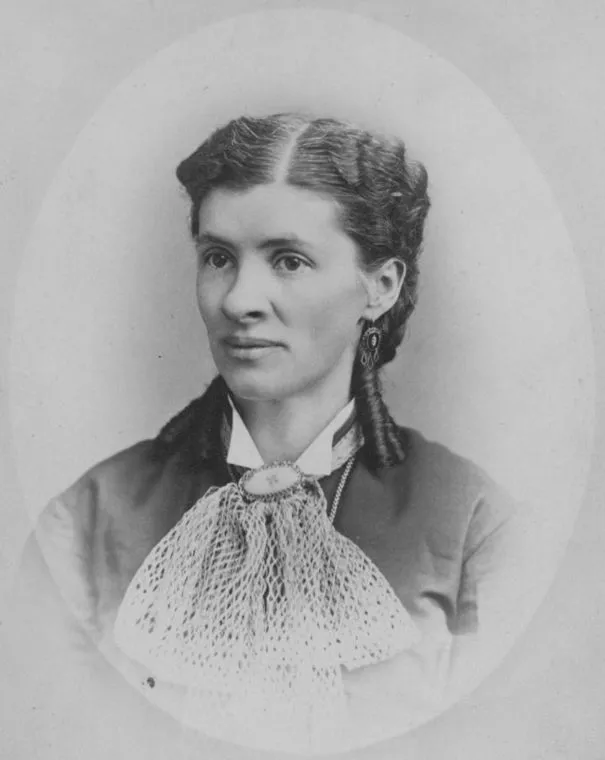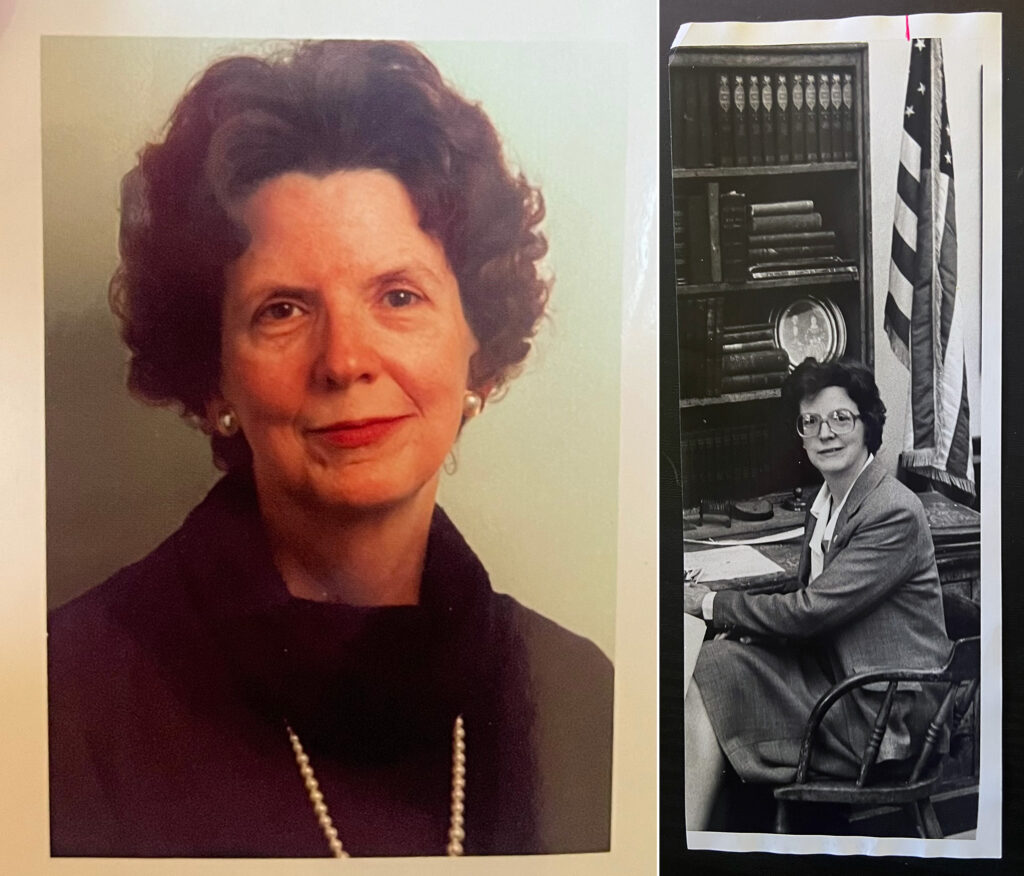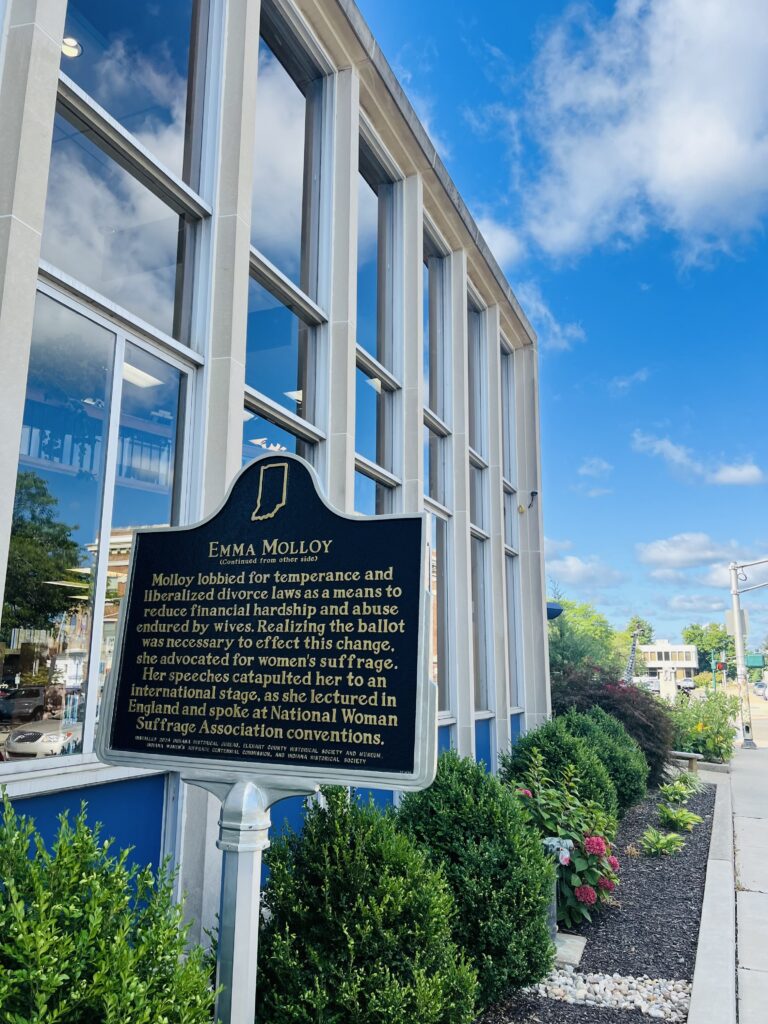With sharp words, Emma Molloy fought for equal rights here
Emma Barrett Molloy saw the promise of a world in which she never lived. Hard-charging trailblazers know no other way.
More than 150 years ago, she arrived in Elkhart with opinions shaped by personal tragedies and societal experiences. Once a week, in the pages of her new Elkhart Observer newspaper, she shared her closely held beliefs and challenged the status quo.
Her words demonstrated intensity and impatience. Everything she did was with the hope of making a better world for the women around her.
“Emma Molloy could nail a chauvinist to the wall. With her pen,” legendary Elkhart Truth reporter Arden Erickson wrote in April 1999.
The first local female newspaper editor has been remembered and honored with an Indiana Historical Marker on downtown’s High Street in front of Elkhart Public Library. One passionate researcher made sure Molloy’s work was not forgotten.
Finding the untold stories
Martha Pickrell worked as a curator at the Northern Indiana Historical Society in the late 1970s when she started re-reading Molloy’s works. She took to sharing her findings, fueling a passion to learn more.
“Elkhart was not settled just by men, but by families,” Pickrell said in November 1984. As The Elkhart Truth’s Melinda Lantz went on to report, “Women in Elkhart’s history made significant contributions to education, industry and the appreciation of the arts, among other areas, but remain obscure because most of the city’s histories have been written by men, (Pickrell) added.”
Molloy made her own contemporary record in the pages of the Observer.

She signed her column in the first edition of the paper, Aug. 21, 1872, “Yours faithfully, Emma.” Alongside, she filled the pages with the words of suffragists like Susan B. Anthony and the progressive ideas of male politicians. In fact, the favored Republican Party candidates in that election year earned a mention every week, listed right beneath the publishers’ names on Page 2.
She never ignored the ideas of – and her feelings about – equality, temperance and voting rights. She delivered those messages in funny and pointed ways.
“If you ever hear a man boast of his determination to rule his own house, you may feel sure that he is subdued,” Molloy wrote in an Observer column on April 30, 1873. “A henpecked husband always makes a great show of opposing anything that looks toward the enlargement of the work or privileges of women. …
“It is a great satisfaction to him that his wife can never be president, and that she cannot make speeches at prayer meetings. While he retains these badges of superiority, he is still in some sense head of the family.
“The signs of the times indicate that the age is producing men and women of a better stamp than these, but there must be a few specimens of the original preserved for the benefit of the next generation.”
A motivated pioneer
Pickrell’s research moved beyond casual interest. She submitted nine boxes of collected history to the Indiana Historical Society in the 1990s. “Emma Speaks Out” – her biography with many of Molloy’s own writings – was released in 1999.

“Her intensity always set her apart,” Pickrell told The Truth then. “She was impatient with the idea that women couldn’t do things.”
Pickrell traced Molloy’s life from her time growing up in South Bend to her journeys as a speaker and evangelist across two continents. She found Molloy’s first husband had been an alcoholic, leading to a lifelong passion to pursue temperance and prohibition.
Molloy also had two children die in infancy and a third as a teenager. Eventually, she divorced her second husband, too, and her political positions brought personal attacks on her morals and integrity.
“How does a woman find success, fulfillment, and acceptance in her work? How does she give sufficient attention to both her work and her family?” Pickrell wrote in the preface to “Emma Speaks Out.” “… And if her role is a public one, how does she deal with the responses that public figures so often arouse?

“A century ago and more, Emma Molloy of Indiana, a pioneering journalist, public speaker, reformer, and evangelist, faced these questions in her own unique way, with few examples to guide her.”
‘Not to pray, but to vote’
Elkhart was a boom town when Molloy and her husband founded the Observer. Railroads were bringing substantial economic growth, Pickrell told audiences, but also societal problems.
Molloy’s experiences during her first marriage made her a leading critic of the nearly three dozen saloons operating in the city.
“(S)he was speaking across the state on the issue of temperance, and pushing for the election of officials at the town and state level who believed in the elimination of alcohol,” wrote Patrick McGuire, curator of education at the Elkhart County Historical Museum in Bristol, for a South Bend Tribune article in March 2017. “She believed that the true way to make changes in society was not to pray, but to vote.”
Leaders of the new Woman’s Christian Temperance Union thought the budding evangelist was too radical. She left Elkhart when the Observer sold in 1876, and she started traveling to take her message across the country and on a speaking tour of England.
“This evil thing will not die of itself, therefore nothing remains as the hope of those of us who have suffered from its curse – not reform, not mitigation, but extirpation by means of prohibition,” Molloy wrote in 1879. “To rely wholly on moral suasion is simply idiotic.”

Emma Molloy left journalism for good in the mid-1880s to be an unaffiliated evangelist for the Methodist Church. She settled in the Pacific Northwest with her third husband. She maintained her strong voice until 1907, when she contracted pneumonia and died during a visit to California.
Women of accomplishments
Just 13 years after Emma Molloy died, the 19th Amendment delivered women the right to vote. That same year, the 18th Amendment took effect and established Prohibition.
“(Molloy) challenged the Crusaders to go beyond their universal tactic of pressuring men for moral reform, to think and work in political ways,” Pickrell wrote in “Emma Speaks Out.” “… She was fired not only by a sense of Christian duty and altruism but also by enthusiasm, ambition, and determination. And unlike many women then and now, she herself made changes when things were not satisfying. She acted, to use a modern phrase, as an empowered woman.”
Pickrell added, “(S)he worked continually at the ‘grass roots’ level to inspire the ordinary man and woman to improve their lives.”
The researcher brought life and perspective to Molloy’s story. She did the same for other women in Elkhart’s past:
* Ann Eliza Babb, a teacher and bookstore owner from whom “many Elkhartans got their first and perhaps only taste of higher learning”;
* Gertrude Bickel Baumgartner, the “Queen of Elkhart” who was organist and choir director at the Congregational Church and credited with being the city’s first librarian; and
* Helen Beardsley, a noted suffragist and public servant.
Many of Martha Pickrell’s articles earned a place in The Elkhart Truth and South Bend Tribune through the years. She also wrote a biography of Dr. Franklin Miles.
She died at age 79 in September 2017.
“(A)s the project archivist for the Elkhart County Historical Museum, I’ve become personally familiar with the archival collections and have come across recurring names of donors, past staff and volunteers who I know were crucial to museum development,” Amy Christiansen wrote in March 2017. “Foremost among those names is Martha Pickrell. …
“Pickrell worked and volunteered at the museum from 1978 to 2011 and was a champion of local history through her research and writings. She worked on projects for nonprofits, businesses and individuals across the Michiana area. Pickrell said she always wanted ‘to find ways to be of use of others.’”